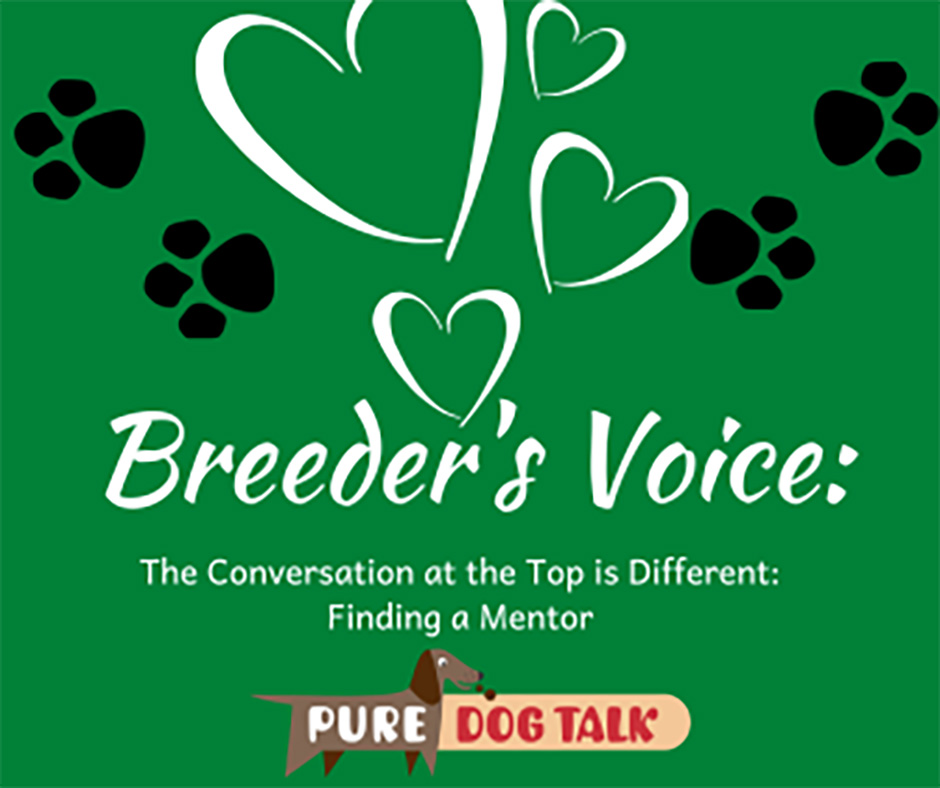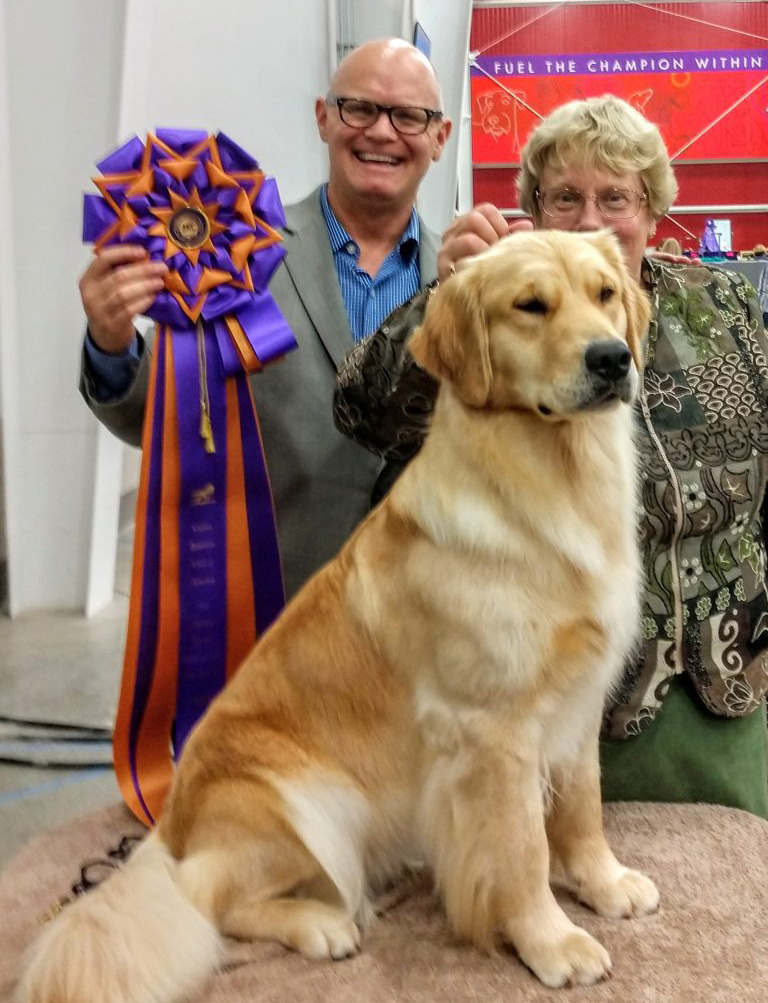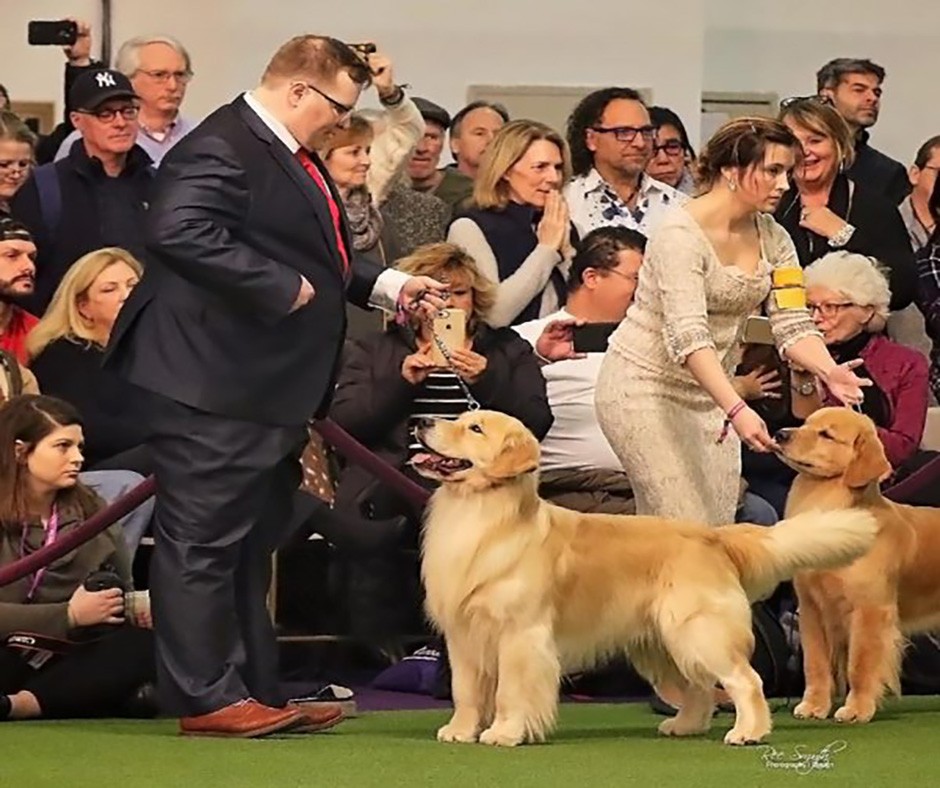646 — The Conversation at the Top is Different: Finding a Mentor
The Conversation at the Top is Different: Finding a Mentor
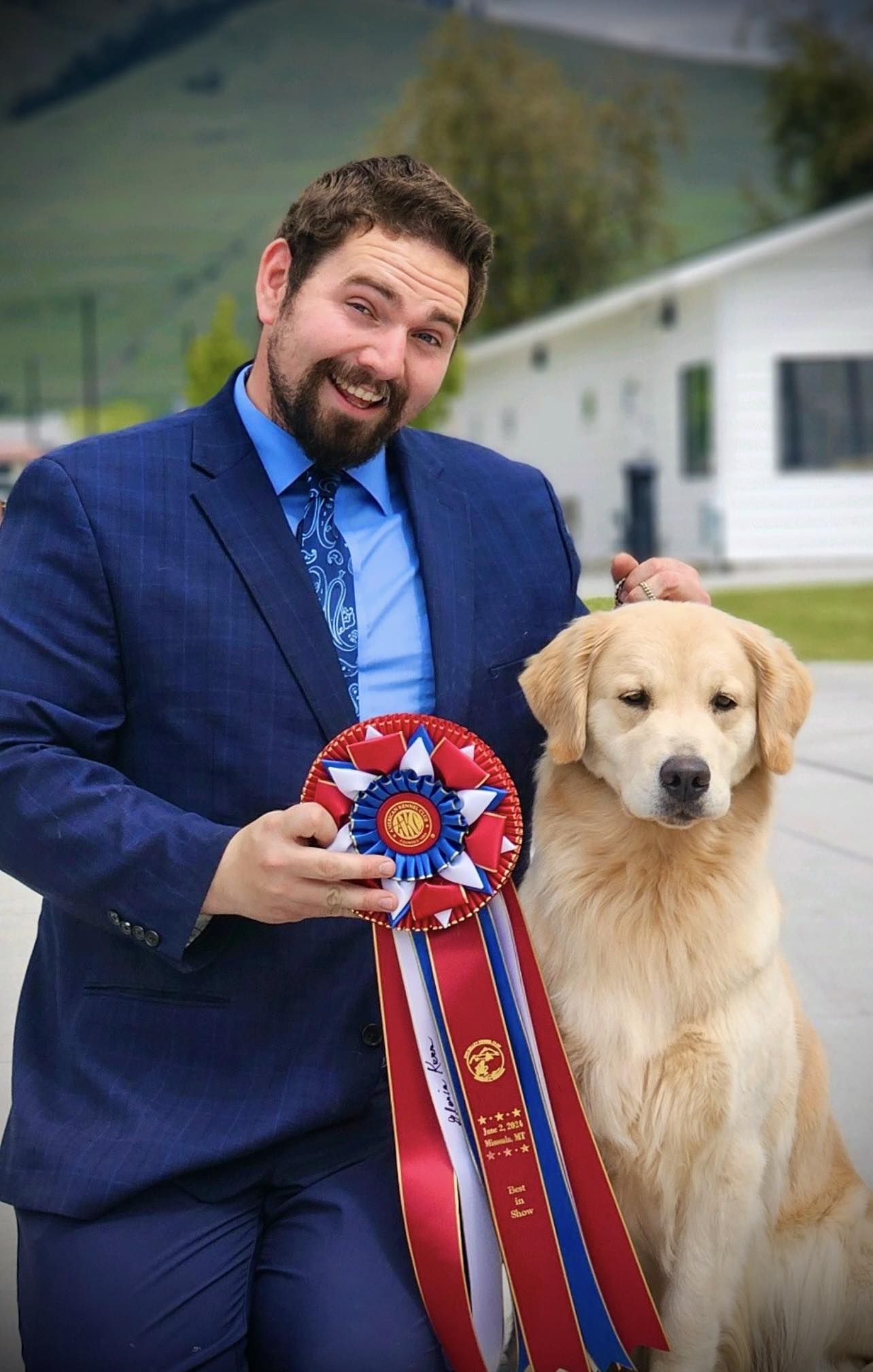
Christian Rutten with one of his top winning Golden Retrievers.
Breeder-handler Christian Rutten joins host Laura Reeves to encourage new exhibitors and breeders in finding a mentor.
“I think the biggest mistake people make is they cut corners,” Rutten said. “They find the people who are sitting and just have a lot of downtime because they’re easy to talk to. But what you need to do is go to the top. The conversation at the top is different.
“Everybody’s collaborating ‘who can do this for what and what reason.’ The conversation at the bottom is usually, ‘it’s crooked… Oh, my dog is perfect and that one isn’t.’
“I would say that the most successful breeders of any breed are way more critical on their own dogs than there are of anybody else’s. When they say, you know, my dog is the greatest that’s ever been and the other one only wins because of who shows it, that’s problematic.
“You need to be self -reflective about what is this dog’s strength and weaknesses. And you know what? If you go ask a judge, right, you lost and you aren’t sure why. And you go ask the judge and the judge says, well, he didn’t ask for it on the day or the other dog showed better or whatever it is. I just discard that.
“When they say, you know, I wish your dog had a little better shoulder, a little bit shorter back, you could use a little bit stronger muzzle, and gets into the finite details, those are the people whose words you hang on, and from there you move forward. So look for the people who are extra critical first, not angry because they lost, but extra critical. And I think if you approach any judge from a standpoint of questioning, ‘what was it that you liked about the other dog better than my dog today,’ they’ll be honest with you.
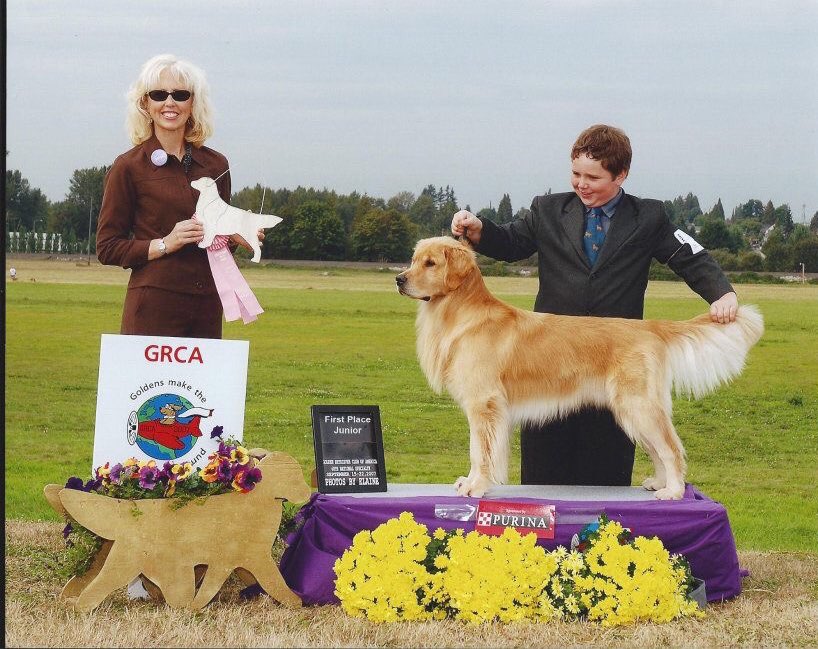
Christian started at ground zero in Junior Showmanship and worked his way up through the ranks.
“Where do you start from ground zero? First thing, anybody, whether you’ve done dogs for 20 years or you’re just starting, go to YouTube and look at Dog Steps. It’s not breed specific, right? It’s just about basic anatomy and how it works in motion.
“The other thing is attend the largest specialties and the nationals that you can and see a broad array (of dogs). If your breed has an illustrated standard, keep that. Go and you seek out those breeders that are just kind of next level. A, I want you to seek out the best breeder there is. B, trust their judgment. But C, be happy if you don’t have the Best in Show winner because when you get handed that Best in Show winner on a golden platter, you cannot figure out what it takes to make it.
“I wrote a thing one time that says sacrifices are made in the whelping box to preserve and protect individual pieces, not to breed just for winners, right? And that’s the thing. Talk to your breeder, what are the health issues that you face and how are you kind of navigating that in your breeding program?
“There’s a fine line between discarding everybody’s opinion and asking everyone and absorbing as much knowledge as you can. There’s 20 ways to get to the bus stop, but getting on the bus and going to your destination is on you.”
334 – Golden Retriever Breed Education with Michael Faulkner
Golden Retriever Breed Education with Michael Faulkner
In honor of the Golden Retriever National Specialty, currently under way in Southern California, Host Laura Reeves visits with legendary judge and breeder Michael Faulkner. Actively involved with Goldens since 1969, Faulkner is deeply passionate about his breed.
Primarily a hunting dog
“This is the GOLDEN Retriever,” Faulkner said. “They have a coat of lustrous gold, they are a water dog, their form and function is to retrieve.
“The standard says ‘primarily a hunting dog,’ moderate, to be shown in good, hard working condition,” Faulkner said
“Yellow Wavy Coated Retrievers”
The double coat protects and wraps the body, Faulkner said. Early historians talk about the development in Scotland of “yellow, wavy coated retrievers.”
“Quite often when you’re judging my breed you’re going to see a coat that wraps the body and it may have a slight wave. That’s perfect. We love it when you can see the natural wrap and frame. The coat should never be curly, but wave is perfectly acceptable,” Faulkner said.
Moderation in all things
Faulkner compares the correct Golden Retriever to a cow: “Moderate, legs underneath them, big rib cage, short loin, level back, thick thigh, tail straight off the back. It’s not a complicated breed.”
A well-known stickler and “old guard” in the breed, Faulkner insists that Goldens were never meant to be “fluffy” and that they “should not look like a baby Newfy.”
Proportions are the biggest thing next to grooming, Faulkner said. The breed standard calls for the body to be [12:11], just off square. They should never be long and low.
Gentleman’s gun dog
“The dogs are not supposed to roll, or lumber (when they move),” Faulkner said. “They are supposed to converge to the center line of travel. People forget that they are supposed to be primarily a hunting dog.
“They were kept by the nobility. Bred to go out with the hunter, work close to their side, bring the bird back, shake dry and lie next to fire.”
The cold water and rocky terrain of the breed’s native Scotland made endurance essential, Faulkner noted. Any exaggeration would hinder the working dog’s efficiency.
332 — Secret to Success with Owner-Handler Matt Palmer
The secret to Success with Owner-Handler Matt Palmer
The 2019 Secret to Success award goes to owner-handler Matt Palmer winning Best of Breed at Westminster Kennel Club with his first show dog. Host Laura Reeves gets up close and personal with everyone’s newest hero.
A Missouri State Public Defender, Palmer discovered Golden Retrievers at the Kennel Club of Philadelphia dog show he visited on a whim. He took AKC’s advice on how to find a reputable breeder, winding up with “great mentors, breeders who took a chance on selling a nice puppy to someone they didn’t know.”
“It’s remarkable the number of people who have “scaffolded me” in this sport,” Palmer said. “People have been amazing. Everyone I’ve come across has helped me in one way or another.”
Palmer said his secret to success came when he was working his dog at a handling class. An instructor noticed the dog tensing up when he was hand-stacked. After working through the problem, Palmer said he realized he “was worried about my jacket riding up and basically mooning everyone.” He bought a pair of suspenders on Amazon and his confidence skyrocketed. The team’s success took off from that point.
“I now own 10 pairs of suspenders and have a couple pair of extras in my tack box,” Palmer said.
“I wanted the purple and gold”
Palmer said his high school sports experiences left him “competitive to a fault,” and gave him the drive to achieve more. While he competed in the National Owner Handled Series his first year or so, glad to have extra time in the ring to practice, “I wanted purple and gold, not the maroon ribbon,” he opined.
Missouri to Manhattan
Deciding to attend Westminster Kennel Club was sort of a lark for Palmer. “I thought it would be cool to go see it. I had absolutely no expectation of significant success,” he said.
As his case load was starting to build up at work, Palmer had planned not to go. After visiting with professional handler friends at the dog show, he finally decided to go ahead and make the trip with them.
Professionals, not adversaries
“I think there is a divide between owner-handler and professional handler when there doesn’t need to be one,” Palmer noted. “I tell people I’m happy to help, hold dogs, etc if they could give me a few minutes of feedback.
“Any chance to learn from professionals is invaluable. I try to absorb things that are second nature, reflexive to them.
“My (professional handler) friend came early to meet me at the Piers so he could be ringside for the breed. He could have been in bed, but instead he grabs a bucket and a towel and stands ringside and cheers me on.”
Poop strike
The most terrifying moment of the Garden experience, Palmer said, is his dog wouldn’t potty. “He grew up in Kansas and Missouri, he’d never seen all that concrete. He wouldn’t poop! I was mortified he was going to touch that green carpet and decide it was a perfect place to poop,” Palmer said wryly.
“Dog shows have been a great social outlet,” Palmer said. “We’ll keep going. It’s so cool, everywhere you go, you see somebody you met somewhere else…
“Sometimes we win, most the time we don’t. But when we do, it’s pretty fun.”
For more inspiring stories of owner-handlers check out some of these past episodes:
57 – Best in Show: How an Owner-Handler Competes with the Pros – Tricia Stanczyk
318 – Owner Handler Secrets: Make a Plan and Be Consistent | Pure Dog Talk
25 – Patricia Trotter: Legendary Breeder, Author, and AKC Judge – Vin-Melca’s Norwegian Elkhounds
238 — The friendships and journeys of a successful owner-handler | Pure Dog Talk

